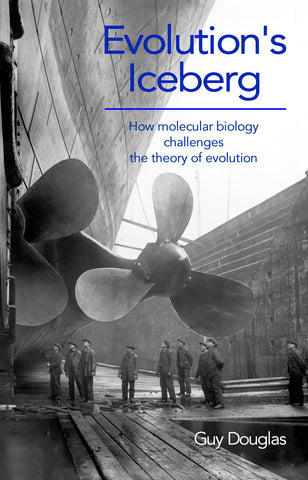Shortly before midnight on Sunday 14th April 1912, RMS Titanic struck an iceberg in the North Atlantic and sank at 2.17 am. What made this tragedy particularly shocking at the time was that Titanic was widely believed to be unsinkable - by passengers, crew and by the public at large. Today Darwin's theory of evolution enjoys a similar "unsinkable" reputation.
The thesis of this book is that 19th century Darwinian science, developing as it did in an age that also gave rise to supreme confidence in Titanic's unsinkability, has collided with the 'iceberg' of 21st century molecular biology. We conduct an inquiry into the evidence and its worldview implications.
What if – just as Titanic had design flaws that rendered it unsinkable only in a limited sense – what if the science underpinning the Theory of Evolution turns out to be valid only in a strictly limited sense?
The amazing discoveries in the late 20th and especially in the early 21st century – of the exquisite micro-molecular machinery and organisational complexity, together with the hierarchical layers of regulatory control systems inside living cells – have become Evolution’s ‘iceberg’.
Part 1 of this highly accessible account begins by exploring questions like: What is “science”?, What is “evolution”?, Has “science" ever got things wrong? Do all scientific disciplines speak with equal authority?
Part 2 investigates five failed predictions of neo-Darwinism now that RMS Evolution has collided with the ‘molecular biology iceberg’. Just as Titanic sank because 5 watertight compartments were breached by the iceberg, we go down ‘below decks’ to inspect the damage inside five putatively watertight compartments – five different strands of evidence claimed to support the theory of evolution – the origin of life, the power of natural selection to invent, the fossil record, embryology and genetics, and human evolution.
Part 3 asks why it is that most ‘smart’ people still believe the grand claims of evolution to be true and why our academic, media and educational institutions still fervently promote the orthodox paradigm while failing to present the counter-evidence. We’ll also explore a theory that better explains the origin of biological information – Intelligent Design.
Occasional allusions to the Titanic metaphor throughout help to illuminate and elucidate the science.
"Evolution’s Iceberg is a book with a very clever analytical structure. Guy Douglas has done an excellent job in summarising and demonstrating how the superstructure of some currently favoured thinking is actually holed below the water line. He carefully disarticulates the components that hold that thinking together and provides a case to show that the commonly understood evolutionary paradigm cannot survive.”
David Galloway MD DSc FRCS FRCP FACS FACP, Honorary Professor of Surgery, University of Glasgow. Former President, Royal College of Physicians and Surgeons of Glasgow
“In this remarkable and intriguing book, Guy Douglas uses the analogy of the ‘unsinkable Titanic’ creatively to expose the critical deficiencies of modern evolutionary theory with its fundamental tenet of blind ‘chance and necessity’. He argues cogently that this is unsustainable, given the breathtaking discoveries of modern molecular biology which point in the very different direction of deliberate design. This is a ‘must read’ for everyone interested in the origin and sophistication of life as we know it.”
Dr Alastair Noble, BSc, PhD, former Inspector of Schools, and Assistant Director of Education
“In this book Guy Douglas presents an insightful parallel between the iceberg that sank the Titanic, and the facts of molecular biology on which the reputedly unsinkable theory of evolution founders.
The author examines five critical issues which are widely believed to support evolution, and shows that evolutionary explanations are seriously lacking – holed beneath the waterline: because of the complexity of molecular biology there is no hope that life could have originated through undirected physical and chemical processes, or of substantial new forms arising subsequently, including the supposed evolution of humans from ancestral apes. And it reinforces the evidence that diverse early embryonic development refutes common ancestry, notably of the different classes of vertebrates.
Unfortunately, as Guy Douglas points out, just as it took a long time for most passengers on the Titanic to realise that it had struck an iceberg, so most people today are unaware that molecular biology sinks the theory of evolution. Fortunately, this book will help to remedy that, and encourage thinking people to take a fresh look at the evidence.”
David W. Swift B.A. (Cantab.), M.Sc., author of Evolution under the microscope

